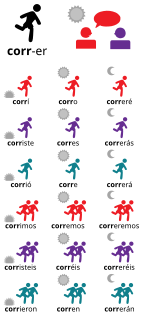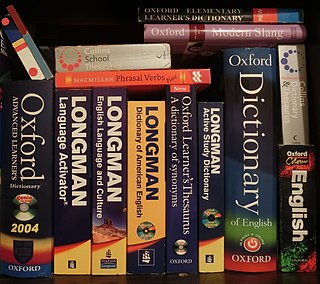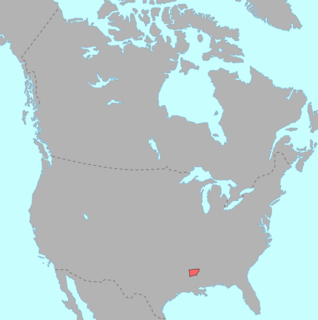The accusative case of a noun is the grammatical case used to mark the direct object of a transitive verb. The same case is used in many languages for the objects of prepositions. It is a noun that is having something done to it, usually joined with the nominative case.
In linguistics, a copula is a term for a word that links the subject of a sentence to a subject complement, such as the word is in the sentence "The sky is blue." The word copula derives from the Latin noun for a "link" or "tie" that connects two different things.

In linguistics, conjugation is the creation of derived forms of a verb from its principal parts by inflection. Verbs may inflect for grammatical categories such as person, number, gender, tense, aspect, mood, voice, case, possession, definiteness, politeness, causativity, clusivity, interrogativity, transitivity, valency, polarity, telicity, volition, mirativity, evidentiality, animacy, associativity, pluractionality, and reciprocity. Verbs may also be affected by agreement, polypersonal agreement, incorporation, noun class, noun classifiers, and verb classifiers. Agglutinative and polysynthetic languages tend to have the most complex conjugations albeit some fusional languages such as Archi can also have extremely complex conjugation. Typically the principal parts are the root and/or several modifications of it (stems). All the different forms of the same verb constitute a lexeme, and the canonical form of the verb that is conventionally used to represent that lexeme is called a lemma.
A verb, from the Latin verbum meaning word, is a word that in syntax conveys an action, an occurrence, or a state of being. In the usual description of English, the basic form, with or without the particle to, is the infinitive. In many languages, verbs are inflected to encode tense, aspect, mood, and voice. A verb may also agree with the person, gender or number of some of its arguments, such as its subject, or object. Verbs have tenses: present, to indicate that an action is being carried out; past, to indicate that an action has been done; future, to indicate that an action will be done.

An adverb is a word that modifies a verb, adjective, determiner, clause, preposition, or sentence. Adverbs typically express manner, place, time, frequency, degree, level of certainty, etc., answering questions such as how?, in what way?, when?, where?, and to what extent?. This function is called the adverbial function, and may be realized by single words (adverbs) or by multi-word expressions.

English grammar is the way in which meanings are encoded into wordings in the English language. This includes the structure of words, phrases, clauses, and sentences, right up to the structure of whole texts.
A noun phrase or nominal phrase is a phrase that has a noun as its head or shows the same grammatical function as such a phrase. Noun phrases are very common cross-linguistically, and they may be the most frequently occurring phrase type.
In grammar, a modifier is an optional element in phrase structure or clause structure. A modifier is so called because it is said to modify another element in the structure, on which it is dependent. Typically the modifier can be removed without affecting the grammar of the sentence. For example, in the English sentence This is a red ball, the adjective red is a modifier, modifying the noun ball. Removal of the modifier would leave This is a ball, which is grammatically correct and equivalent in structure to the original sentence.
A verbal noun is a noun formed from or otherwise corresponding to a verb. Different languages have different types of verbal nouns and different ways of forming and using them. An example of a verbal noun in English is the word singing in the sentence "Singing is fun" . Verbal nouns may be non-finite verb forms such as infinitives or gerunds in English usage. They may also be "pure" verbal nouns, formed from verbs, but behaving grammatically entirely like nouns rather than verbs. Such cases may also be called deverbal nouns.
Yaqui, locally known as Yoeme or Yoem Noki, is a Native American language of the Uto-Aztecan family. It is spoken by about 20,000 Yaqui people, in the Mexican state of Sonora and across the border in Arizona in the United States.
Zero copula is a linguistic phenomenon whereby the subject is joined to the predicate without overt marking of this relationship. One can distinguish languages that simply do not have a copula and languages that have a copula that is optional in some contexts.

The Tunica language is a language isolate that was spoken in the Central and Lower Mississippi Valley in the United States by Native American Tunica peoples. There are no native speakers of the Tunica language, but as of 2017, there are 32 second language speakers.
The Japanese language does not have words that function as adjectives in a syntactic sense – that is to say that tree diagrams of Japanese sentences can be constructed without employing adjective phrases. Nevertheless, Japanese has words that mean the same as English adjectives. This article deals with those words.

-ing is a suffix used to make one of the inflected forms of English verbs. This verb form is used as a present participle, as a gerund, and sometimes as an independent noun or adjective. The suffix is also found in certain words like morning and ceiling, and in names such as Browning.
In descriptions of the Japanese language, an adjectival noun, adjectival, or na-adjective is a noun that can function as an adjective by taking the particle 〜な -na. Adjectival nouns constitute one of several Japanese word classes that can be considered equivalent to adjectives.
In grammar, a subject complement or predicative of the subject is a predicative expression that follows a linking verb (copula) and that complements the subject of the sentence by either (1) renaming it or (2) describing it. It completes the meaning of the subject. In the former case, a renaming noun phrase such as a noun or pronoun is called a predicative nominal. An adjective following the copula and describing the subject is called a predicative adjective. In either case the predicative complement in effect mirrors the subject. Subject complements are used with a small class of verbs called linking verbs or copulas, of which be is the most common. Since copulas are stative verbs, subject complements are not affected by any action of the verb. Subject complements are typically not clause arguments, nor are they clause adjuncts. A predicative complement can be either a subject complement or an object complement.
An attributive verb is a verb that modifies a noun in the manner of an attributive adjective, rather than express an independent idea as a predicate.
The morphology of the Welsh language shows many characteristics perhaps unfamiliar to speakers of English or continental European languages like French or German, but has much in common with the other modern Insular Celtic languages: Irish, Scottish Gaelic, Manx, Cornish, and Breton. Welsh is a moderately inflected language. Verbs inflect for person, tense and mood with affirmative, interrogative and negative conjugations of some verbs. There are few case inflections in Literary Welsh, being confined to certain pronouns.






